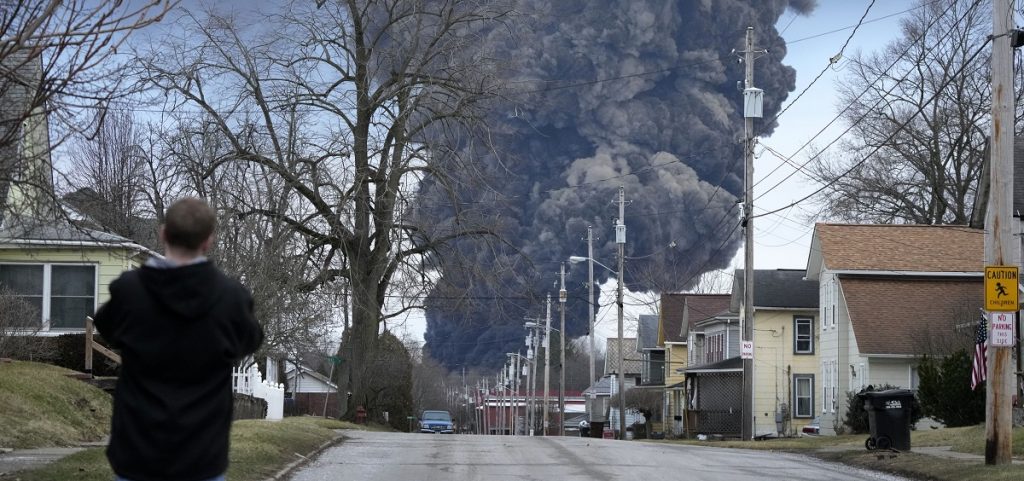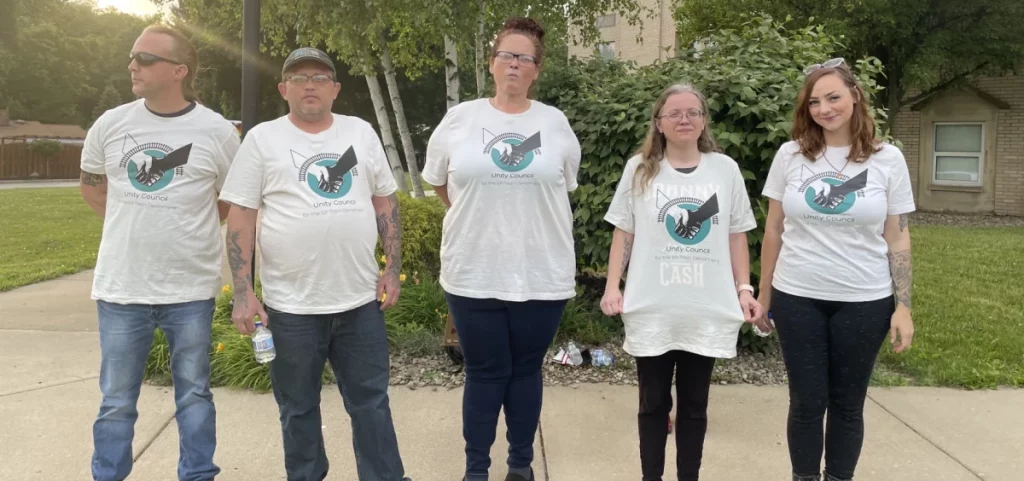News
One year after the derailment, East Palestine residents still question the health of the town
By: Abigail Bottar | ideastream
Posted on:
EAST PALESTINE, Ohio (Ideastream Public Media) — Saturday, Feb. 3 marks one year since a train carrying hazardous chemicals derailed in East Palestine. The accident upended life in the small town on the border of Ohio and Pennsylvania, leaving residents with questions about their health and the environment.
The train was carrying the carcinogen vinyl chloride, along with other chemicals, causing residents to evacuate while emergency responders worked to get the scene under control. East Palestine’s fire chief ultimately made the decision to vent and burn the vinyl chloride in five tanker cars out of fear of the chemicals causing a toxic explosion. That decision and Norfolk Southern’s practices have come under fire from residents and rail safety advocates.
Since the state lifted its evacuation order on Feb. 8, 2023, residents have complained of health symptoms they say are related to the derailment and shared concerns that the environment is not safe to live in.

Environmental cleanup in East Palestine
Images of a fireball and a plume of black smoke rising from a controlled burn of toxic chemicals in East Palestine gripped national attention. A year later, Norfolk Southern, the freight rail company that owned the train that derailed, said the major site remediation work is complete.
The U.S. Environmental Protection Agency ordered Norfolk Southern to cleanup the town on Feb. 21, 2023, which included digging up the soil from under the train tracks and shipping it to remediation facilities. The company is still cleaning up a couple of creeks that were contaminated during the derailment.
Making things right
Norfolk Southern has promised to make things right in East Palestine, but whether the company has kept its promise depends on who’s asked.
Norfolk Southern said it’s spent hundreds of millions of dollars on community support. Will Harden has been leading the team in East Palestine which staffs Norfolk Southern’s Family Assistance Center.
“We have processed or handled 4,500 households through the Family Assistance Center since the date of the derailment,” he said, “and those households have come through over 11,500 times, visits to the Family Assistance Center.”
Some support is ending soon. On Feb. 9, Norfolk Southern will no longer be reimbursing families for the cost of hotel rooms and living expenses, and there are people who have evacuated their homes and not yet returned. This applies to less than 40 households who voluntarily relocated during the track remediation process, Harden said.
Zsuzsa Gyenes has been living in a hotel since the derailment, and Norfolk Southern told her they would stop reimbursing her for her hotel room on Feb. 9, she said. The whole experience has been a lot of back and forth and confusion on what’s safe and what can be reimbursed, she said.
“We didn’t know we weren’t going to be able to go back at first, and we didn’t know when anything would happen or if we would get help to move somewhere else or where it was safe to go,” Gyenes said. “There were just so many unknowns for so long. I would never have chosen to stay in a hotel this long.”
She’s looking for an apartment for her and her 10-year-old son but said she wishes Norfolk Southern would help more.
“Honestly what I’ve been asking them since day one is just to replace what I had and find me another place that I can afford and pay for at least my moving costs,” Gyenes said.
She lost a lot of her belongings like furniture after the derailment because of the odor from the chemicals that spilled.
Gyenes has felt stuck since the derailment, a sentiment Jami Wallace agrees with. Wallace helped start the Unity Council for the East Palestine Train Derailment, which advocates for the residents impacted by the accident.

Norfolk Southern should continue to reimburse people who are living out of town due to the derailment, she said.
“People still don’t feel safe going back to their homes,” Wallace said.
What else do East Palestine residents need?
Some residents say Norfolk Southern has not done enough to support them in the year since the derailment.
In addition to helping her relocate, Gyenes hopes Norfolk Southern will create a long-term fund to pay for any future health problems related to the derailment.
“I want to know that if I develop cancer in two years from now or if I start having problems or if my son starts having some all kinds of endocrine issues or whatever’s going on, immune responses, I want to know that I’m not going to go into debt and I’m not going to lose everything,” she said.
The Ohio Attorney General’s office had been working with Norfolk Southern on establishing both a long-term health fund and a fund to pay for any water contamination issues the town may have in the future, but the office did not respond to a request for comment on the status of this.
Norfolk Southern has spent $25 million to renovate East Palestine City Park, $4.2 million to support local agencies and nonprofits in Pennsylvania, $534,000 to fund a Community Resiliency Center to address mental health issues, $500,000 to support economic development in East Palestine and more, the company said. But Wallace feels like Norfolk Southern is just throwing money at the problem instead of really fixing it.
“All this money, I could go on and on with the thing that they’re doing to build up the community so that there will be faster economic recovery,” she said, “but they’re doing it at the expense of the human health issues, at the expense of the residents that have been financially devastated.”
Wallace and others want Norfolk Southern to pay for more testing in East Palestine.
“We still have not had our homes tested,” she said. “We still have not had residential soil tested.”
Moving out of town
Norfolk Southern has been assisting homeowners who want to sell their houses in East Palestine, the company said.
The company established a Value Assurance Program, which will pay homeowners the difference between the appraised market value of their home and the sale price, and the program is well underway, Harden said.
“The vendor who is overseeing the Value Assurance Program for Norfolk Southern has received about 90 phone calls,” he said. “There are currently eight properties at various stage[s] in the Value Assurance Program.”
The housing market in East Palestine has been strong from the sale prices he’s seen, he said, but this program doesn’t solve everyone’s problems.
“My parents, they had to come back home. They had no other choice. They own their house,” Wallace said. “People say, ‘Why don’t you sell it?’ It’s been in my stepdad’s family for six generations. He doesn’t want to move. He wants to know of it’s safe.”
It’s important to note that the U.S. and Ohio EPAs both have maintained that the air and water in East Palestine are safe and that it is safe to live there. But Wallace’s mom has been sick since she moved back to her home in East Palestine.
What’s next?
Norfolk Southern is in East Palestine for the long run, Harden said, but recently there have been fewer visits to the Family Assistance Center as more people move back into town. However, the Family Assistance Center will continue to run the Value Assurance Program, and Norfolk Southern is still helping support about 10 households who have been out of their homes since the derailment, Harden said.

